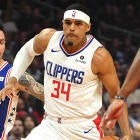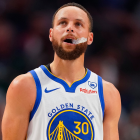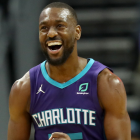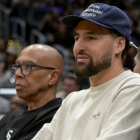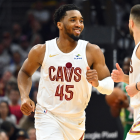The Philadelphia 76ers and Los Angeles Clippers made a blockbuster trade late Tuesday night, headlined by almost-All-Star Tobias Harris going East. The deal illustrates that these two teams have drastically different priorities for the next few months: the Sixers want to compete for a championship right now, while the Clippers are focused on free agency this coming summer.
The particulars: Philadelphia gave up rookie sharpshooter Landry Shamet, forward Wilson Chandler, stretch big man MIke Muscala, its 2020 first-round pick, Miami's 2021 first-round pick and its 2021 and 2023 second-round picks in order to make a massive upgrade to its starting five. Los Angeles sent Harris, his enormous buddy Boban Marjanovic and stretch forward Mike Scott to the Sixers, likely taking itself out of the playoff race but giving the front office a bunch of tools to use as it tries to construct a superteam of its own.
Let's grade the trade.
 Philadelphia 76ers: B
Philadelphia 76ers: B
Philly receives:
- Tobias Harris
- Boban Marjanovic
- Mike Scott
If it wasn't already obvious that the Sixers were all-in on this season when they traded for Jimmy Butler, it is now. Ben Simmons and Joel Embiid are 22 and 24, respectively, but they got a taste of the playoffs last season and coach Brett Brown told the team on the first day of training camp that their goal was to make the Finals.
This trade appears to make that much more likely. In last season's playoffs, Philadelphia had such difficulty creating offense that it had to bench Robert Covington, one of the best defenders in the league, for backup point guard T.J. McConnell. This time around, having multiple competent playmakers on the court should no longer be an issue -- Harris is averaging a career-high 20.9 points with extreme efficiency -- and its starting lineup is downright fearsome.
By becoming a great 3-point shooter over the past couple of years, Harris made himself into an ideal complement to the Sixers' stars, as long as he is prepared for his usage rate to drop when they're all on the court together. He can make 3s off the catch and off the bounce, and he can make plays off the dribble. In the playoffs, against switching defenses, his ability to take advantage of mismatches and simply shoot over smaller players should be helpful. Harris is not a lockdown defender, but he can essentially do what Chandler did on that end
Scott, 30, should fit in just fine as a floor spacer. He does not have the size to directly replace Muscala, who shifted between power forward and center, but that might not matter with Marjanovic and Jonah Bolden on the roster. Coach Brett Brown now has two very different looks for different situations at that spot -- can't you picture Marjanovic checking into a playoff game and dominating for a few minutes?
Before the trade, the two main criticisms of Philadelphia were that it was top-heavy and its pieces didn't quite fit. I would argue, though, that for a team with this many star (or star-adjacent) players, the on-court fit issues are minor. The Sixers obviously need to try to find role players on the buyout market, but they needed that before this trade, too. The issues here are not about what they have assembled, but the price they paid to do it:
- Shamet is just 21, and since he was selected No. 26 in last year's draft, represented a low-cost rotation player for the next few years. He was particularly important because, even before this trade, it looked like it would be difficult to retain JJ Redick in free agency. If you are looking at buyout candidates, focus on guards.
- They gave up the Heat pick. This pick, acquired from Phoenix on draft night, was Philadelphia's reward for trading down to take Zhaire Smith instead of Mikal Bridges. At the time, that trade felt like a shoutout to the Sam Hinkie era, as the Sixers were thinking about the future rather than looking for an immediate payoff. We don't know where that pick will fall, but it has lots of theoretical value right now because it is unprotected. In a weird way, Philadelphia fans will be rooting for Miami to be pretty good in the 2020-2021 season.
- The Sixers have sacrificed flexibility. It is easy to say that all the extra stuff in the trade -- their first-round pick and two seconds -- shouldn't matter that much when seriously competing for championships. All that stuff, though, can become incredibly important when trying to make the marginal moves necessary to balance out a roster. From his time in Los Angeles, Redick knows better than anyone what it's like to have a killer starting five and a weak bench.
This move raises Philadelphia's ceiling, and it also raises the stakes. The plan is to re-sign Butler and Harris this summer, according to ESPN's Adrian Wojnarowski, and that means this better work. If it doesn't, they could walk for nothing, making both of the Sixers' big, bold moves seem shortsighted.
 Los Angeles Clippers: A
Los Angeles Clippers: A
L.A. receives:
- Landry Shamet
- Wilson Chandler
- Mike Muscala
- Philadelphia's 2020 first-round pick (protected)
- Miami's 2021 first-round pick (unprotected)
- Philadelphia's 2021 second-round pick
- Philadelphia's 2023 second-round pick
In his last game as a Clipper, Harris had 34 points, five assists and seven rebounds while shooting 13-for-21 -- and 6-for-7 from deep! -- against the Charlotte Hornets. Los Angeles trailed by as many as 20 points in Charlotte on Tuesday, mere hours before the trade, but fought back and escaped with a win thanks to Harris' game-winning runner.
This seemed significant even before we knew that Harris would be traded, as the victory meant the Clippers were 30-25, a game in front of the Kings and two-and-a-half games up on the Lakers for the eighth playoff spot in the West. Had the Clippers declined to do anything big before Thursday's trade deadline, the rest of their season would be about hanging onto that spot.
To be clear, this move does not make it impossible for Los Angeles to make the playoffs. It makes it much less likely, though, and that might be a feature rather than a bug: The Clippers owe the Boston Celtics a first-round pick, but it is lottery-protected -- missing the playoffs would mean having a first-round pick this June.
Beyond that potential benefit, Los Angeles did this for simple, sensible reasons. Harris has played so well that he should command a maximum contract in July, and, if the Clippers' summer goes as well as they hope, they won't be able to give him that contract. The whole league knows they want to sign Kawhi Leonard and are hoping to acquire another superstar with him. Maybe they can sign Kevin Durant and make the New York Knicks look silly. Maybe they can make a compelling offer for Anthony Davis, now that they have all these extra picks. Los Angeles is aiming high, and while retaining Harris would have been a nice fallback plan, he might not have wanted to wait around while the front office tries to get bigger names.
From the Clippers' perspective, this should be seen as impressive value for what is essentially a rental. When they're meeting with free agents, they can point to Lou Williams, Montrezl Harrell, Shai Gilgeous-Alexander, Danilo Gallinari, Shamet and these picks to show that it will not take them years to put together a suitable supporting cast. Unlike the Sixers, we don't know what Los Angeles' team will actually look like over the next few seasons. We just know it has plenty of options.
If there is risk here, it is that the aforementioned fallback plan is probably gone. Theoretically, the Clippers could still sign Harris as a free agent, but it is hard to see him going back there after this. What happens if Leonard stays in Toronto, Durant goes to New York, Davis gets traded to the Lakers, Kemba Walker re-signs in Charlotte and Kyrie Irving stays in Boston? I happen to like what Los Angeles did here, but it is always worth acknowledging that flexibility doesn't guarantee anything. Just like Philadelphia, there is real pressure on the Clippers. The difference is that it will be felt in the offseason, not the postseason.









